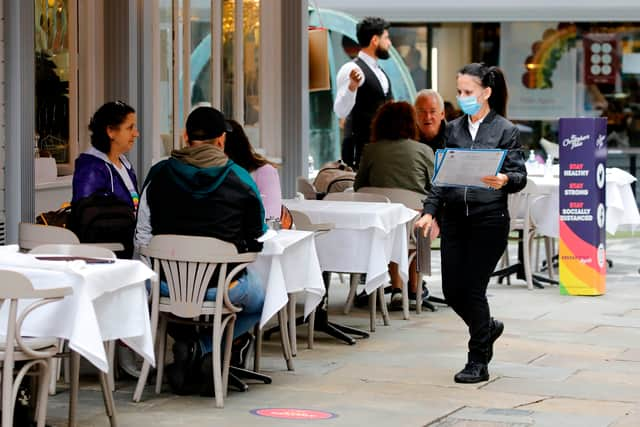Calorie count menus: why mental health experts in Birmingham have called for calorie-free menus to be offered
and live on Freeview channel 276
Mental health experts in Birmingham are calling for restaurants and cafe’s across the city to offer calorie-free menus to support young people recovering from eating disorders.
The team from Forward Thinking Birmingham (FTB) Specialist Eating Disorder service (SEDS) launched an ‘Eating Out Without The Calorie Count’ campaign.
Advertisement
Hide AdAdvertisement
Hide AdWhy has FTB launched this campaign? Here’s what you need to know.
Why do menus have calorie counts?


In April 2022, parliament passed legislation making it compulsory for restaurants, cafes and takeaways with over 250 staff to print calorie labels on menus.
If this rule is ignored, companies would have to pay a fine of £2,500.
The reason for this call was part of the Government’s strategy to beat obesity, with estimated figures looking at obesity-related conditions costing the NHS £6.1 billion each year.
Advertisement
Hide AdAdvertisement
Hide AdWith the pandemic, weight-related issues resulted in increased ICU admissions and the severity of the virus.
A petition to stop the plans for calorie counts on menus was launched citing that it would be to the “extreme mental and physical detriment” of those suffering from eating disorders.
When the petition to the UK Government closed in February 2021 it had gathered more than 18,000 signatures.
Why has Forward Thinking Birmingham launched this campaign?


Advertisement
Hide AdAdvertisement
Hide AdForward Thinking Birmingham is part of Birmingham Women’s and Children’s NHS Foundation Trust and is a Mental Health Service offering support, care and treatment to people up to 25 years of age.
The goal of the Eating Out Without The Calorie Count campaign is to encourage Birmingham restaurants to be recovery friendly and to allow people who are recovering from an eating disorder to feel safe when eating out.
Calorie counting is a common method people use when trying to maintain certain body weight or eat according to specific dietary rules.
A mother whose daughter is being cared for in Birmingham Women’s and Children’s NHS Foundation Trust’s inpatient Mental Health Services, has also spoken about the campaign.
Advertisement
Hide AdAdvertisement
Hide AdShe said: “When we go for meals, it should be a treat and a nice thing to do as a family, but having calories on menus adds anxiety to what should be a pleasant outing.
“When there are calories on menus, I can see how difficult it is for my daughter who is struggling with an eating disorder. If we had that option to request calorie-free menus ahead of time, it would take away so much stress and help us to normalise eating out and once again make it an enjoyable experience.”
Jessica Sharman, a Peer Support Worker who is also part of the Eating Disorder Peer Recovery group, said: “Seeing calories displayed on menus can be a huge challenge for people with experience of eating disorders. To me, it feels like a reminder of all the times I obsessed over calorie-counting and could not sit and enjoy a meal without guilt and shame afterwards.
“I am now better able to deal with these triggers, but I know for many it is a great barrier to their recovery. It takes away from what going out for a meal should be, enjoying ourselves and spending time with loved ones.”
What has been said about the new campaign?
Advertisement
Hide AdAdvertisement
Hide AdDr Sheryllin McNeil, Consultant Clinical Psychologist within SEDS said: “For people who are affected by and recovering from eating disorders, the presence of calorie labelling on menus is potentially unhelpful and possibly damaging to their wellbeing and recovery.
“It has been a real honour to work alongside our Peer Support workers on this important issue that recognises the detrimental impact the presence of calories on menus can have on an individual’s journey to recovery.
“We recognise that much of this work is done outside of the clinics in the communities we live in, so this particular community engagement project is an important step in supporting people affected by eating disorders to reclaim their lives.”
Kirsty Stapledon, 22, from Birmingham, works with the SEDs team. As one of FTB’s Children’s Hospital Charity funded Peer Supporters, she uses her lived experience of having an eating disorder to support service users.
Advertisement
Hide AdAdvertisement
Hide AdShe said: “When I heard the news about the new legislation, it sparked something in me. While I consider myself recovered from my eating disorder, it made me worry about my mental health and if it would influence how I act at a restaurant.
“When someone with an eating disorder is in recovery, we’re trying to learn that food is more than numbers; it’s about nutrition and the benefits to your body. Having that calorie-free menu option would support and help our service users who are recovering.”
Comment Guidelines
National World encourages reader discussion on our stories. User feedback, insights and back-and-forth exchanges add a rich layer of context to reporting. Please review our Community Guidelines before commenting.
